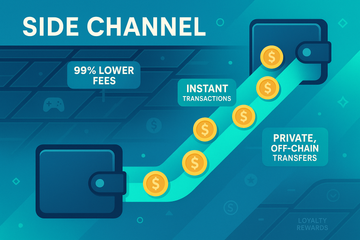Ever wish you could settle up with a friend at a café without waiting in line at the bank or getting your accountant involved? That’s the spirit behind state channels in cryptocurrency. They’re like stepping into a private booth away from the noisy, bustling main blockchain—where you and your counterpart can chat, trade, and square things up, all off the record, then bring your final handshake to the public ledger. If you’re curious about how these discreet side-channels work, where they're used, and why Ledger or Trezor wallet users might care, pull up a chair.
Pulling Back the Curtain: What’s a State Channel?
Picture state channels as two-way roads running parallel to the main crypto highway. You and another person (or even a service) open a direct line between your digital wallets. Funds get locked in a sort of escrow, governed by a smart contract. Now, transactions zip back and forth off-chain—away from the crowds and the traffic jams of the main network.
Once you’re done—maybe you’ve traded tokens, played a few rounds of a blockchain-based game, or split some digital tips—you send one final update to the main blockchain. That’s the only bit that’s permanently recorded for all to see. Sound efficient? It’s downright transformative for speed and cost.
Here’s the Thing: How State Channels Actually Work
Let’s break it down, step by step:
- Getting Things Started: Both participants agree to open a state channel, usually by locking some crypto in a smart contract (think: digital tab). Only thing public so far is you’re starting this tab.
- Trading Off-Chain: Every time you exchange value—whether it’s sending some ETH, in-game rewards, or making micro-payments—you both sign a digital message updating your balances. These messages never touch the main blockchain … unless there’s a problem.
- Closing Time: When you’re finished transacting, you submit the latest (and hopefully agreed upon!) state back to the blockchain. Funds are distributed according to what you both signed off on. Only this final summary makes it into the blockchain’s public history.
It’s like having a running tab at your favorite pub, instead of paying the bartender after every single pint. Cheaper, faster, and a little more fun—until someone tries to dispute the bill.
You Know What? Disputes Happen
Not everyone’s always trustworthy. If someone tries to cheat—maybe they submit an older balance that’s better for them—there’s a solution built in. The smart contract sets up a challenge period (think of it as a referee’s time-out). During this window, you can prove the most recent, honest state with your signatures.
If the cheater’s caught, penalties can apply. This system keeps everyone playing nice, and it’s all handled by code—no need to call in a blockchain lawyer. Frankly, it’s an elegant bit of engineering.
Why Bother? The Real Benefits
- Speed: Off-chain transactions happen in a blink—milliseconds instead of minutes. Forget waiting for network confirmations while your coffee gets cold.
- Low Fees: Pay once to open, once to close; everything in between is basically free. Imagine sending dozens of micro-payments without those pesky gas costs piling up.
- Scalability: By clearing the traffic from main roads, state channels help blockchains handle many more users. It’s a win-win for both casual users and network health.
- Privacy: Your off-chain back-and-forth isn’t public—a nice plus for those who don’t want their business out in the open.
Digression: State Channels Versus Other Layer 2 Solutions
Let me take a quick detour. State channels aren’t the only game in town. There’s also rollups and sidechains. Rollups are like sending a big group email summary to everyone, instead of one email at a time. Sidechains, meanwhile, are separate little blockchains that periodically connect back to the main hub.
But state channels really shine for situations with lots of repeat interactions between limited parties—think head-to-head gaming, streaming, or rapid-fire trading. Rollups work better for mass batching, like crowd events or giant NFT drops. Different contexts, different tools.
Real-World Examples: Who’s Actually Using State Channels?
You might’ve heard whispers of names like Raiden Network, the Ethereum-based answer to rapid peer-to-peer payments. Or maybe Connext, which lets people send funds instantly across networks. Statechannels.org is a great spot to see current progress and projects.
While you won’t transfer your Ledger hardware wallet keys over a state channel directly—the channel just moves funds, not wallet secrets—hardware wallets like Ledger or Trezor are still immensely useful. They let you safely sign those all-important channel opening or closing transactions, keeping your crypto secure even while you’re zipping transactions off-chain.
Everyday Use Cases: Not Just for Millionaires or Geeks
- Gaming: Ever played a blockchain card game? State channels keep the shuffling and dealing quick, only posting the end result.
- Micro-Payments: News sites, streaming platforms, and even online tipping can become ultra-cheap and instant.
- Retail Loyalty: Frequent flyer miles, loyalty points, or coupons—why not settle those off-chain and keep fees negligible?
See? State channels are deeply practical, not some ivory-tower tech experiment.
So… Are State Channels the Future?
Honestly, they’re one critical piece of the ever-evolving puzzle of making crypto truly usable for everyone, everywhere. State channels won’t replace the blockchain, just like restaurant tabs didn’t replace cash registers. But for those situations that need lots of quick, private interaction? They’re a breath of fresh air.
Hardware wallets like Ledger and Trezor remain your personal bodyguards for when you step back onto the main blockchain stage. They don’t “do” state channels directly, but they’re the safest way to sign off at the start and end of every off-chain adventure.
Next time you hear about blockchain congestion, high gas fees, or folks waiting for transactions to clear, remember: sometimes, the best conversations really do happen just off-stage. That’s what state channels are all about—smart, efficient, personal, and just a little bit secret. And maybe, just maybe, that’s the way you’d want it.











